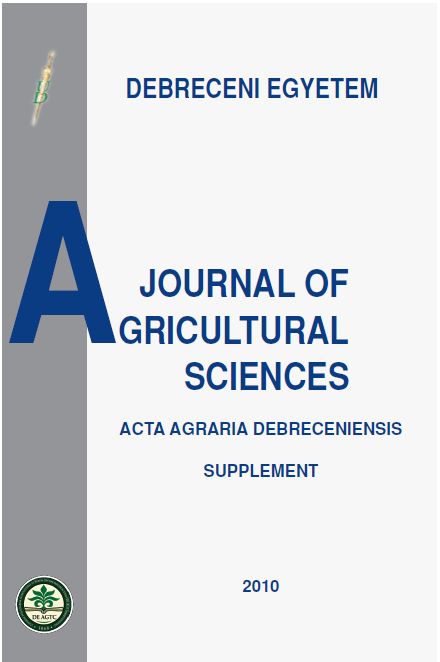Examination of Zn deficiency on some physiological parameters in case of maize and cucumber seedlings
Author
View
Keywords
License

This work is licensed under a Creative Commons Attribution 4.0 International License.
How To Cite
Abstract
Zinc (Zn) is an essential micronutrient needed not only for people, but also crops. Almost half of the world’s cereal crops are deficient in
Zn, leading to poor crop yields. In fact, one-third (33%) of the world's population is at risk of Zn deficiency in rates, ranging from 4% to
73% depending on the given country. Zn deficiency in agricultural soils is also a major global problem affecting both crop yield and quality.
The Zn contents of soils in Hungary are medium or rather small. Generally, the rate of Zn deficiency is higher on sand, sandy loam or soil
types of large organic matter contents. High pH and calcium carbonate contents are the main reasons for the low availability of Zn for
plants (Karimian and Moafpouryan, 1999). It has been reported that the high-concentration application of phosphate fertilisers reduces Zn
availability (Khosgoftarmanesh et al., 2006). Areas with Zn deficiency are particularly extensive in Békés, Fejér and Tolna County in
Hungary, yet these areas feature topsoils of high organic matter contents. Usually, Zn is absorbed strongly in the upper part the soil, and it
has been observed that the uptakeable Zn contents of soil are lower than 1.4 mg kg-1.
Maize is one of the most important crops in Hungary, grown in the largest areas, and belongs to the most sensitive cultures to Zn
deficiency. Zn deficiency can causes serious damage in yield (as large as 80 %), especially in case of maize. On the other hand, Zn
deficiency can also cause serious reduction in the yields of dicots. One of the most important vegetables of canning industry is cucumber,
which is grown all over the world.
In this study, the effects of Zn deficiency have investigated on the growth of shoots and roots, relative and absolute chlorophyll contents,
fresh and dry matter accumulation, total root and shoot lengths, the leaf number and leaf area of test plants in laboratory. Experimental
plants used have been maize (Zea mays L. cv. Reseda sc.) and cucumber (Cucumis sativus L. cv. Delicatess). A monocot and dicot plant have
chosen a to investigate the effects of Zn deficiency, because they have different nutrient uptake mechanism.
It has been observed that the unfavourable effects of Zn deficiency have caused damage in some physiological parameters, and
significantly reduced the growth, chlorophyll contents of monocots and dicots alike.

 https://doi.org/10.34101/ACTAAGRAR/I/8363
https://doi.org/10.34101/ACTAAGRAR/I/8363